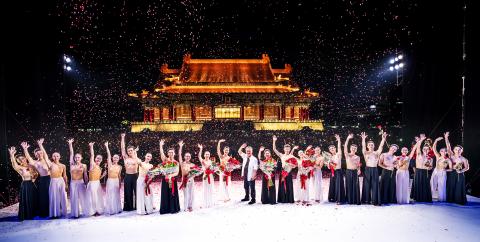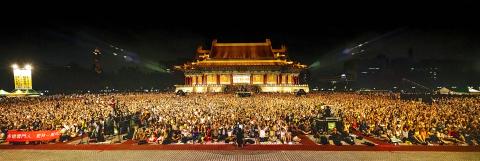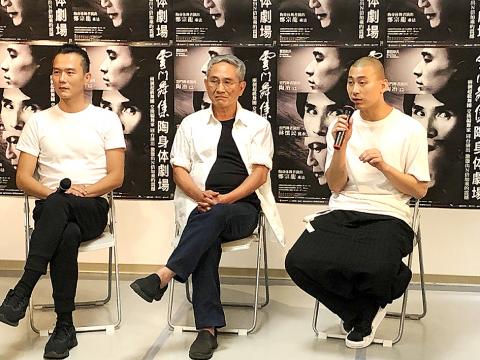Cloud Gate Dance Theatre (雲門舞集) said forty-thousand people packed Taipei’s Liberty Plaza on Saturday last week to see its last annual outdoor performance overseen by Lin Hwai-min (林懷民) before he retires at the end of the year.
Not all 40,000 were there for the whole performance of the troupe’s 45th Anniversary Gala Program. However, the first diehard souls began arriving after 11am to stake out spots right in front the stage erected behind the National Theater. There were toddlers in strollers and octogenarians, people who had been coming ever since the first free outdoor performance 24 years ago and many who just wanted to be a part of a historic evening and the company’s Gate’s 2,432nd performance.
It was a beautiful evening, as well as a historic one: A last chance to see some memorable dances and the last chance to see some of the company’s senior dancers.

Photo courtesy of Liu Chen-hsiang
For not only is Lin retiring at the end of the year, nine dancers are leaving as well, and the company itself has already begun to change structurally — as of yesterday there are no longer two troupes, Cloud Gate and Cloud Gate 2 (雲門 2), but just one: the Cloud Gate Dance Theatre of Taiwan, though no one is shutting the door on the idea of reviving the second company at a later date.
PROGRAM
But that is the future. On Saturday, the focus was on the past, with the spotlight shining on the third and fourth-generation dancers in some of their favorite roles of the past two decades.

Photo courtesy of Liu Chen-hsiang
Even if you had seen them dance in these works before, or seen the program when it premiered last fall, the two huge screens allowed viewers to really focus on them, from the 26-year veterans Chou Chang-ning (周章佞) — who opened the program with her solo on the character for eternal (永) from Cursive (行草) and had a later solo from White Water (白水) — and Yang I-chun (楊儀君) in her White Dress solo from Portrait of the Families (家族合唱), to 19-year veterans Tsai Ming-yuan (蔡銘元) and Huang Pei-hua (黃珮華), who were as beautiful as always in their Pollen duet from Rice (稻禾), while she was just extraordinary in her long solo from Moon Water (水月).
Su I-ping (蘇依屏), who has 18 years with the troupe, shone in an excerpt from Pine Smoke (松煙) that closed the show, Ko Wan-chun (柯宛均), with 15 years, made the Moon Water group segment special.
In the 10 years and up group, Huang Mei-ya (黃媺雅) was stunning in the Autumn Path duet from Bamboo Dream (竹夢) as well as the Coincidence excerpt from How Can I Live On Without You (如果沒有你), while Wong Lap-cheong (王立翔) and Lin Hsin-fang (林心放) were fun to watch in their solos from that work as well.

Photo: Diane Baker, Taipei Times
Also memorable, though you could not see her face in the black body stock and mask she wore, was Chen Lien-wei (陳聯瑋) in the Black Angel sequence from Wind Shadow (風.影).
At the curtain call, the nine veterans were given big bouquets of red roses by members of Cloud Gate 2 — along with Lee Ching-chun (李靜君), who joined the troupe in 1983 and became associate artistic director a few years ago when she stopped dancing — while the rest of the cast received single red roses.
As a shower of petals rained down on the stage, Lin told the crowd not to be sad.
“I and a few dancers are about to leave the Cloud Gate stage, but the Cloud Gate Dance Theatre is not retired! See you in the square [next] July,” he said.
While it really was a farewell performance for Tsai, who is going to become rehearsal director for the company, fans will still have a few more chances to see Chou, Yang, Su and the two Huangs, who will be in Lin Hwai-min’s final work (for now) for his company, Autumn River (秋水), part of the EXCHANGE triple bill for the troupe’s national tour this fall.
NEXT UP
It has been frustrating over the past few weeks trying to get information about EXCHANGE and the national tour: Cloud Gate’s own Web site was maddingly vague, while only National Kaohsiung Center for the Arts’’ (Weiwuying) site listed the program.
It turns out that was because while EXCHANGE will premiere at Weiwuying on Oct. 11 for a three-show run, it is actually part of the National Theater’s annual fall dance series, which this year is titled Stop Talking, Star Dancing! (閉幕派對), and the National Taichung Theater’s Fall for Great Souls (遇見巨人) series and both were waiting to list the show on their sites until they held news conference announcing the series. Those finally happened last week.
EXCHANGE is a collaboration between Cloud Gate and the Beijing-based TAO Dance Theater (陶身体劇場), a troupe that Lin Hwai-min has championed for many years and one that was founded in March 2008 by Tao Ye (陶冶) and Wang Hao (王好).
Lin Hwai-min invited TAO for the 2012 Novel Hall Dance Series, although an injury to one of the dancers meant the troupe’s Taiwan premiere had to be postponed, and it was not until the 2104 Novel series that the company made its Taipei debut.
He once famously said that Tao was “not just the best choreographer in China, but one of the best in the world.”
Since then, TAO Dance has returned to Taiwan several times, both at Cloud Gate’s invitation and others.
For EXCHANGE, Lin Hwai-min contributed Autumn River, Cheng Tsung-lung (鄭宗龍), who will succeed him on Jan. 1 next year, created the second and Tao the third.
Cheng’s piece, Multiplication (乘法), is set on TAO’s nine dancers, while Tao’s piece, 12 — he always uses numbers for his titles — is set on 12 Cloud Gate dancers.
Following the Kaohsiung premier, EXCHANGE will be performed at the National Theater from Oct. 17 to 20 and in Taichung on Oct. 26 and 27. Tickets for all the shows are now available on the arts.ticket.com.tw Web site and tat he three theaters’ box offices, and are expected to go fast.
Following the national tour, Cloud Gate will take EXCHANGE on tour to several cities in China in November and December — and then on Dec. 31, Lin Hwai-min will formally step down from the company he created, although he will remain a member of the Cloud Gate Foundation board.

Growing up in a rural, religious community in western Canada, Kyle McCarthy loved hockey, but once he came out at 19, he quit, convinced being openly gay and an active player was untenable. So the 32-year-old says he is “very surprised” by the runaway success of Heated Rivalry, a Canadian-made series about the romance between two closeted gay players in a sport that has historically made gay men feel unwelcome. Ben Baby, the 43-year-old commissioner of the Toronto Gay Hockey Association (TGHA), calls the success of the show — which has catapulted its young lead actors to stardom -- “shocking,” and says

Inside an ordinary-looking townhouse on a narrow road in central Kaohsiung, Tsai A-li (蔡阿李) raised her three children alone for 15 years. As far as the children knew, their father was away working in the US. They were kept in the dark for as long as possible by their mother, for the truth was perhaps too sad and unjust for their young minds to bear. The family home of White Terror victim Ko Chi-hua (柯旗化) is now open to the public. Admission is free and it is just a short walk from the Kaohsiung train station. Walk two blocks south along Jhongshan

The People’s Republic of China (PRC) invaded Vietnam in 1979, following a year of increasingly tense relations between the two states. Beijing viewed Vietnam’s close relations with Soviet Russia as a threat. One of the pretexts it used was the alleged mistreatment of the ethnic Chinese in Vietnam. Tension between the ethnic Chinese and governments in Vietnam had been ongoing for decades. The French used to play off the Vietnamese against the Chinese as a divide-and-rule strategy. The Saigon government in 1956 compelled all Vietnam-born Chinese to adopt Vietnamese citizenship. It also banned them from 11 trades they had previously

The 2018 nine-in-one local elections were a wild ride that no one saw coming. Entering that year, the Chinese Nationalist Party (KMT) was demoralized and in disarray — and fearing an existential crisis. By the end of the year, the party was riding high and swept most of the country in a landslide, including toppling the Democratic Progressive Party (DPP) in their Kaohsiung stronghold. Could something like that happen again on the DPP side in this year’s nine-in-one elections? The short answer is not exactly; the conditions were very specific. However, it does illustrate how swiftly every assumption early in an